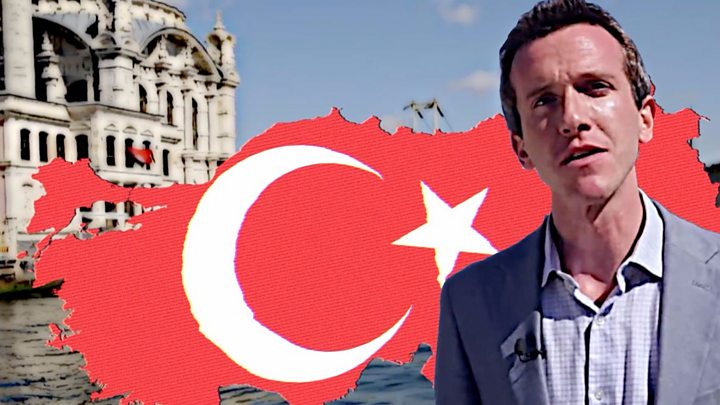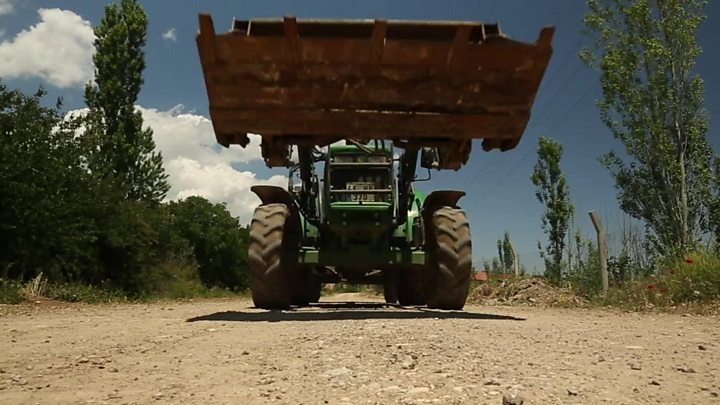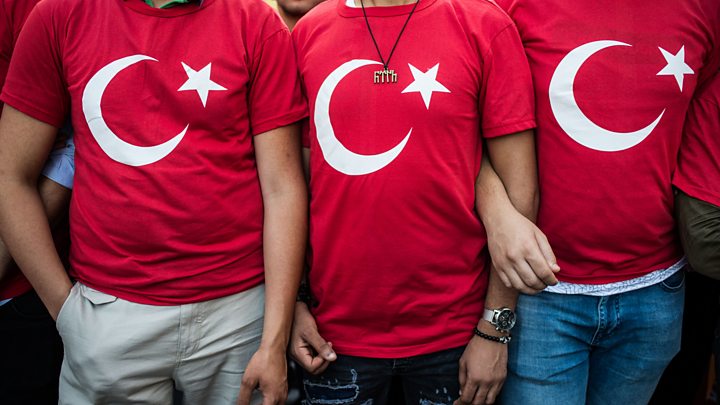
Turkish voters are set to decide whether to grant President Recep Tayyip Erdogan a second five-year term in the most fiercely-fought elections the country has seen in years.
Polls open at 08:00 (05:00 GMT) in snap presidential and parliamentary elections.
If Mr Erdogan wins the presidential vote, he will adopt major new powers.
But he faces a major challenge from centre-left candidate Muharrem Ince of the Republican People's Party (CHP).
Turkey remains under a state of emergency imposed in the aftermath of a failed coup in July 2016.
These elections were originally scheduled for November 2019 but were brought forward by Mr Erdogan.
What do the candidates say about each other?
Mr Erdogan and his main rival Muharrem Ince both held huge rallies on Saturday, their final day of campaigning - and each branded the other unfit to run Turkey.
Mr Ince, whose fiery campaigning has revitalised Turkey's demoralised opposition, promised to push back what he characterised as a slide into authoritarian rule under Mr Erdogan.
"If Erdogan wins, your phones will continue to be listened to... Fear will continue to reign," he told at least a million people gathered in Istanbul. "If Ince wins, the courts will be independent."
Mr Ince also said that if elected, he would lift Turkey's state of emergency within 48 hours. Emergency rule allows the government to bypass parliament.
At his own rally, President Erdogan - who was prime minister for 11 years before becoming president in 2014 - used a violent metaphor to summarise his hoped-for result, asking supporters, "Are we going to give them an Ottoman slap [a technique for knocking someone out] tomorrow?"
He accused Mr Ince - a former teacher and MP of 16 years - of lacking the skills to lead.
"It's one thing to be a physics teacher, it's another thing to run a country," Mr Erdogan said. "Being president needs experience."
He told supporters he planned to push through more major infrastructure projects to boost the economy.
Analysis: Judgement day for Turkey's powerful president
By Mark Lowen, BBC Turkey Correspondent
Never in its modern history has this crucial country felt so divided. And never has Recep Tayyip Erdogan faced such a tough election fight.
Turkey's most powerful leader since its founding father Ataturk would become more powerful still if he wins, scrapping the post of prime minister and weakening parliament. But if he fails to reach 50% in the presidential vote, he'll face a run-off, probably with Muharrem Ince, a fiery centre-left candidate who has electrified the campaign.
In the parliamentary poll, a united opposition is hoping to deprive Mr Erdogan of his majority. Worshipped by his supporters, abhorred by his critics, this is President Erdogan's judgement day. Nobody can tell which way it will go.
How will the voting work?
Two votes are being held on Sunday - one to choose Turkey's next president, and another to pick members of parliament.
Around 60 million Turks are eligible to take part.
Six candidates are vying for the presidency, and if one of them wins more than 50% of the vote they will be elected outright.
If nobody hits that threshold, the top two will face off in a second-round vote on 8 July.
Mr Erdogan will be hoping to win decisively, as a run-off vote could end in defeat or narrow his margin of victory.
In the parliamentary election, the president's AK Party (AKP) will face a tough battle to keep its majority in the 600-seat assembly.
The contest pits a government-led coalition against an alliance of opposition parties.
The performance of the pro-Kurdish Peoples Democratic Party (HDP) could prove decisive. If it hits the 10% vote-share needed to enter parliament, it will be harder for the AKP to retain its dominance.
The HDP's presidential candidate Selahattin Demirtas is presently detained in a high-security prison on terror charges, which he firmly denies.
What are the main election issues?
The biggest is the economy. The Turkish lira has tanked and inflation stands at around 11% - so ordinary people are feeling the squeeze.
Terrorism is another vexed issue, as Turkey faces attacks from Kurdish militants and the jihadists of the Islamic State group.

However, our correspondent says the country tends to vote along its big divides: One between Kurds and nationalists, and another between religious and secular people.
Will the vote be free and fair?
Polls will open amid high security. In Istanbul alone, more than 38,000 police officers are expected to be on duty.
Fears have been raised about possible voter intimidation, especially in south-eastern areas where Kurdish votes are key to the result.
Electoral fraud is another potential risk, especially as a new law allows ballot papers to be counted even if they do not have the election board's stamp to mark them as genuine.
Alcohol sales will be banned on Sunday - which is normal for Turkey on polling days.
What happens if Mr Erdogan wins?
He would start his second term in a turbo-charged version of the job.
The presidency was once a largely ceremonial role, but in April 2017, 51% of Turkish voters endorsed a new constitution that grants the president new powers.
These include:
- Directly appointing top public officials, including ministers and vice-presidents
- The power to intervene in the country's legal system
- The power to impose a state of emergency
The job of prime minister will also be scrapped.
Critics have accused Mr Erdogan of trying to usher in one-man rule, and his rival candidates have said they would not bring in the changes.

If both elections go against the current president, Turkey's political landscape will change significantly.
But if the presidency goes one way and parliament another, it could trigger a period of political instability in the years to come.
The country has gone through a tumultuous period since the 2016 coup attempt. More than 160,000 people have been detained, according to the UN, as part of a crackdown on perceived followers of US-based cleric Fethullah Gulen, whom the government accuses of being behind the plot. He denies any involvement.